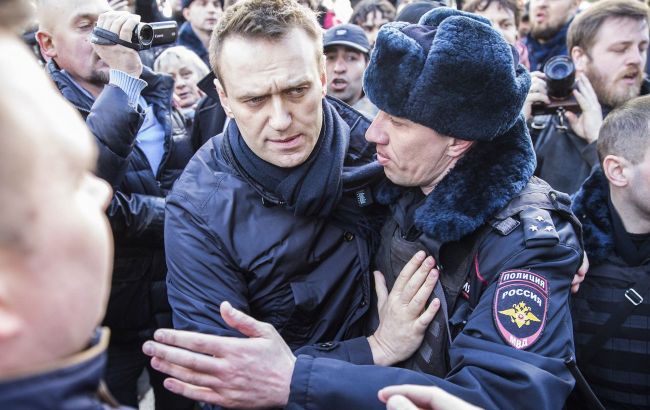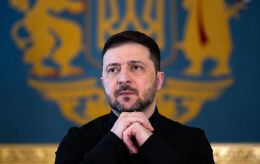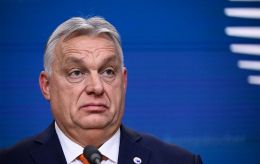'Man Vladimir Putin fears most': Key details surrounding Navalny's death
 Alexei Navalny (Photo: Getty Images)
Alexei Navalny (Photo: Getty Images)
In Russia, it has been announced that the politician Alexei Navalny has died in Correctional Colony No. 3 in the Yamalo-Nenets Autonomous District. The so-called Russian opposition leader reportedly fell unconscious after a walk in the colony, and emergency doctors who arrived on the scene quickly confirmed his death.
What is known about Navalny's death, whether it will impact the situation in the Russian Federation, and how Ukraine and the world are reacting to it can be found in the material from RBC-Ukraine below.
During the preparation of the material, information from the local administration of the Federal Penitentiary Service, a statement from Navalny's press secretary, Kira Yarmysh, the Russian news agency Meduza, and other Russian media outlets were used, as well as the reactions of President Volodymyr Zelenskyy and other world leaders.
What are the named causes of death
The Russian Federal Penitentiary Service was the first to report Navalny's death.
"In Correctional Colony No. 3, convicted Navalny A.A. felt unwell after a walk, practically losing consciousness almost immediately. Medical staff from the institution immediately arrived, and an ambulance brigade was called. All necessary resuscitation measures were taken, which did not yield positive results. Emergency doctors confirmed the death of the convict. The causes of death are being established," the penitentiary service statement said.
The Russian Telegram channel Baza reported that Navalny began to feel unwell around one o'clock in the afternoon (local time). An ambulance was called for him, and doctors tried to save Alexei, but in vain; he died at 14:17.
Meanwhile, the Russian propaganda channel RT put forward its version of the politician's death, claiming that Navalny had a thrombus.
What the Kremlin says
Russian presidential press secretary Dmitry Peskov said he has no information about the cause of Navalny's death.
According to him, this is something "doctors should establish." Peskov also said that "Putin has been informed of Navalny's death."
"Vladimir Putin has been informed of Navalny's death. Special correspondent of Kommersant and Putin's chronicler Andrey Kolesnikov said that the president 'held on' upon learning about Navalny's death," Russian media reported.
What the politician's team says
Navalny's own team currently has no confirmation of the politician's death, according to his press secretary, Kira Yarmysh.
The politician's lawyer, Leonid Solovyov, said that Navalny was last seen on Wednesday, and "everything was fine" then.
"At the request of Alexei Navalny's family, I do not comment on anything at all," the lawyer noted.
Ivan Zhdanov from Navalny's team said that according to the rules, relatives should be informed of the prisoner's death within a day, but so far, there have been no notifications.
The politician's lawyer headed to the town of Kharp, where Correctional Colony No. 3 is located.
The Investigative Committee of the Russian Federation has now begun an investigation into the fact of Alexei Navalny's death in the colony.
Reaction of Ukraine and the world
President of Ukraine
Ukrainian President Volodymyr Zelenskyy, who is currently visiting Germany, reacted to the news of Navalny's death during a joint press conference with Chancellor Olaf Scholz. According to him, it is obvious that Putin killed the politician.
"It has just been reported that Alexei Navalny died in a Russian prison. He was obviously killed by Putin, like thousands of others who have been oppressed by this regime. Putin doesn't care who dies, as long as he maintains his power," the president says.
Chair of the European Council
In turn, European Council President Charles Michel has said that the EU holds Russia responsible for Navalny's death.
President of the European Commission
European Commission President Ursula von der Leyen has noted that she is "deeply disturbed and saddened by news of the death of Alexei Navalny."
"Putin fears nothing more than dissent from his own people. A grim reminder of what Putin and his regime are all about. Let's unite in our fight to safeguard the freedom and safety of those who dare to stand up against autocracy," she writes on social media.
NATO Secretary-General
NATO Secretary-General believes that "all the facts have to be established and Russia has serious questions to answer."
Journalist Hristo Grozev
Bulgarian investigative journalist Hristo Grozev, who, together with Russian opposition figure, identified the real names of FSB employees who may have been behind the poisoning of Alexei Navalny in 2020, also reacted to the news of the politician's death.
"Navalny was finally killed by Putin today," Grozev wrote on X.
Will Navalny's death affect the situation in Russia?
As expert of the Information Resistance Group, Oleksandr Kovalenko, commented to RBC-Ukraine, the death of Russian politician Alexei Navalny is unlikely to lead to any upheavals within Russia. In the expert's opinion, nothing of the sort will happen. There will be a lot of talk, but essentially, no one will do anything.
"It is a murder Putin allowed himself to perpetrate. Moreover, in my opinion, it's a demonstrative execution. Putin needed it to once again show that he has unlimited power. Last year, he demonstratively killed Yevgeny Prigozhin and Dmitry Utkin, showing what will happen to those who oppose him and his entourage with weapons in their hands," Kovalenko says.
More details with comments can be found in the material from RBC-Ukraine.
Who is Navalny?
Alexei Navalny was 47 years old. He is also the founder of the Anti-Corruption Foundation. He positioned himself as a politician opposed to Russian President Vladimir Putin. In 2020, there was an assassination attempt on his life; he was poisoned with the nerve agent Novichok.
Navalny became known as the organizer of demonstrations against corruption in Russia, as well as against President Vladimir Putin and his government. The Wall Street Journal once described Navalny as "the man Vladimir Putin fears most."
In 2013, Navalny ran for mayor of Moscow. He came in second, receiving 27% of the vote.
During the elections in Russia, Navalny said that the most acceptable option, in his opinion, was to vote "for any party against United Russia." He also organized protests in Russia and called on people to attend rallies in major cities.
In 2017, Navalny filed documents to register for the presidential elections, but the Central Election Commission refused to register his candidacy.
Before his imprisonment, he often published anti-corruption investigations into Russian officials, including the Kremlin's chief.
Overall, several criminal cases were brought against Navalny.
On March 22, 2022, the Lefortovo Court in Moscow sentenced him to 9 years in a strict regime colony with a fine of 1.2 million rubles on charges of fraud and contempt of court.
On August 4 of this year, he was sentenced to 19 years in a special regime colony on charges of extremism.
Recently, Navalny was transferred from Moscow to a special regime colony above the Arctic Circle, from where he first contacted on January 10.
More about Navalny's biography can be found in the material from RBC-Ukraine "Main convict in Russia: Who is Navalny and why he was jailed?"

